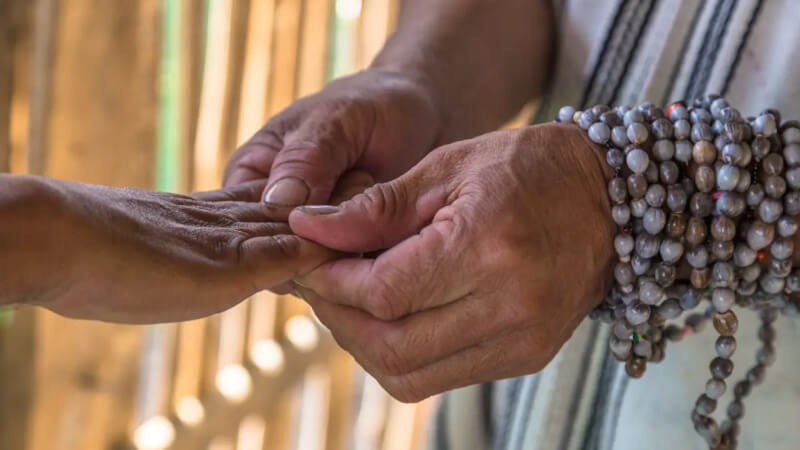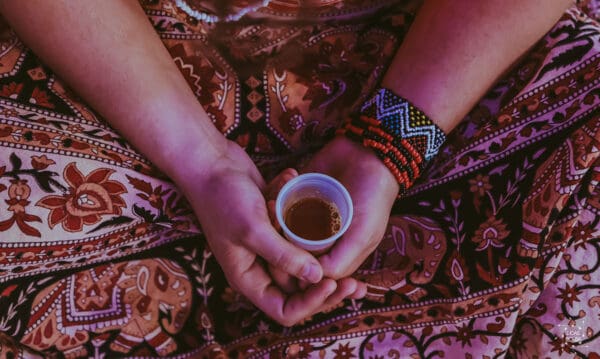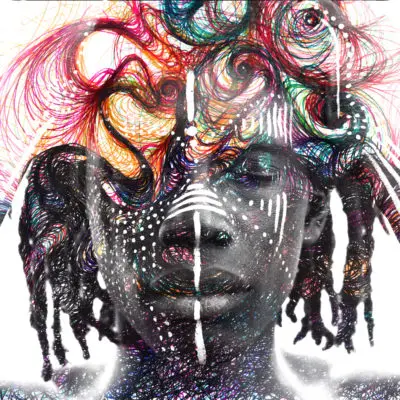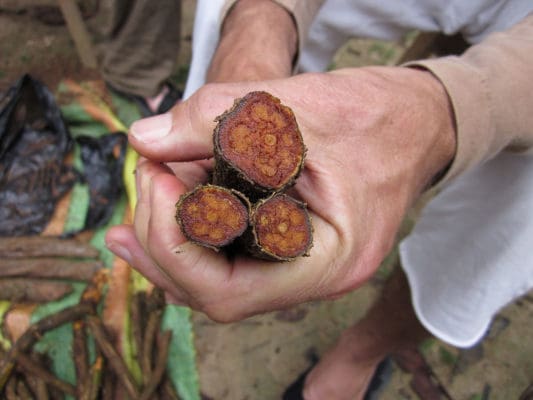The ayahuasca business is booming. While this means that more people than ever are experiencing the healing powers of the brew, its newfound popularity has also ushered in a slew of charlatans pretending to be shamans. As an ayahuasca shaman not only facilitates the ceremony but often sources and brews the medicine, this person may be the most important ingredient in ayahuasca. Before one sits in an ayahuasca circle, they should ensure that their leader is ethically sound and educated, and experienced in the ways of the plant.
Keep reading to learn what ayahuasca is, what does it mean to be a shaman, why that word is controversial, and how to find a reputable facilitator.
What is Ayahuasca?
Ayahuasca is a brew of two plant ingredients: the Banisteriopsis caapi (ayahuasca) vine and Psychotria viridis (chacruna) leaf. The ayahuasca vine contains monoamine oxidase inhibitors or MAOIs, while the chacruna leaf contains N,N-dimethyltryptamine (DMT). DMT is a potent psychedelic molecule that is responsible for most of the psychoactive effects of ayahuasca.
In the U.S., DMT is a Schedule I drug, keeping most American ayahuasca ceremonies underground. Two American churches (Unaio Do Vegetal and Santo Daime) are allowed to consume the tea legally under the Religious Freedom Restoration Act.
Amazonian indigenous people in countries like Colombia, Brazil, Ecuador, and Peru have been using ayahuasca for hundreds if not thousands of years, as both medicine and a tool and ritual for spiritual growth. An increasing number of Westerners travel to these countries where plant medicine is legally available to sit circle in a traditional environment.
Ayahuasca also shows promise as a medicine for treating mental health conditions. For instance, research suggests that it can activate repressed memories, which is one reason it’s being studied as a psychedelic therapy for PTSD and depression. People report that ayahuasca can allow people to access and process traumatic memories and unhealthy habits, helping them find new perspectives and enact positive life changes.
Who are Ayahuasca Shamans?
First, one must recognize that the use of the word “shaman” can be controversial. A shaman generally refers to an indigenous holy person who works with the spirit world through altered states of consciousness. In the context of ayahuasca, these healers may also be called an Ayahuasquero, Taita, Curandero, Onaya, or Maestro. Religions and other organizations in the U.S. and other areas outside South America that hold ayahuasca ceremonies may refer to the leader by a different name, particularly if that person has no cultural ties to the Amazon region. “Plastic shaman” is a term referring to non-indigenous people attempting to pass themselves off as legitimate shamans without legitimate training.
Before sitting circle, regardless of the location of the ceremony, one should research the organization and its leaders to ensure that they are not practicing cultural appropriation. Finding a trusted ayahuasca facilitator requires more than accessing what someone looks like. Due to the rise of the plant medicine’s popularity, some people may take part in a ceremony a handful of times and decide they want to administer the brew to others, calling themselves a shaman. This not only harms indigenous culture but can be dangerous for those sitting circle. Ayahuasca should not be taken lightly. When taken with a sketchy facilitator, one opens themselves up to the possibility of physical, emotional, and spiritual harm.
South American Shamans and Ceremonies
Ayahuasca is only indigenous to South America, and is legal to consume Peru and Brazil, and is in a legal grey area in Colombia and Ecuador. There are also ayahuasca retreats throughout Central America and in Colombia and Ecuador.
In recent years, as news of the healing power of ayahuasca has spread beyond Amazonian borders, there’s been a boom in the number of people traveling to South America to sit ceremony with authentic indigenous shamans. Folks seeking a legitimate experience in ayahuasca’s homeland may feel called to South America. Respected ceremonies in this region can be led by a shaman deeply rooted in ayahuasca’s history, traditions, and culture. While trusted ceremonies take place elsewhere, people interested in a deeply authentic experience may feel called to trek to South America.
Retreats that occur outside of the U.S., particularly in South America, can have a high barrier of entry due to expenses and the time one needs to take off of work. An ayahuasca ceremony abroad can cost upwards of $3,000 after the price of the retreat and travel. If one can afford it, however, the experience of sitting circle in ayahuasca’s home jungle can be invaluable. Compassionate retreats may offer financing options to make the experience more accessible, however, keep in mind that these are indigenous people trying to make a living by sharing their sacred culture, and deserve to be properly compensated for their work.
U.S. Shamans and Ceremonies
There are ceremonies in the U.S. While DMT is a Schedule I drug that classifies ayahuasca as illegal in the U.S, two American churches (Unaio Do Vegetal and Santo Daime) are allowed to consume the tea legally under the Religious Freedom Restoration Act. Both religions originated in the Amazonian region of Brazil. Santo Daime respects and follows traditional South American shamanism intertwined with the ideology of multiple Christian denominations. Animism, the belief that all things have a spirit or soul and are a part of the divine, is a central pillar of their worship.
The Oklevueha Native American Church (ONAC) also provides ayahuasca and ceremonies in the United States, but they do not have the same legitimacy as churches such as Santo Daime. The National Council of Native American Churches (NCNAC), which is an indigenous organization that has a religious exemption for the use of peyote as a spiritual sacrament, rather than ayahuasca, issued public statements denouncing ONAC for exploiting indigenous beliefs in an effort to provide ceremonies to the public (and profit off of them). ONAC was not founded by indigenous people, so should be avoided if one wants a truly legitimate ceremony experience in the U.S.
There is also an array of respected underground ceremonies in the U.S. which operate outside the law. Because DMT is still a Schedule I substance, there is not much way around this. Such ceremonies can be well-run and fulfilling. Often people are invited to sit simply through word of mouth, and one should be wary of any ceremony that advertises its underground services. Research the organization, laws, screening process, sustainability of the vine being used in the brew, and of course, the shaman, before sitting circle.
U.S. retreats might be shorter in duration, easier to travel to, and as a result, be less expensive. However, this does not mean they are always financially accessible. Each night of a three-day retreat might still cost hundreds of dollars (or more) on top of additional preparation and travel fees.
Ethical and Safety Considerations
Unfortunately, the boom in ayahuasca interest has resulted in charlatans claiming to be ayahuasca facilitators all over the world. People new to ayahuasca and psychedelics become prey for such imposters. Unethical and untrained individuals can put people at harm, with there even being examples of sexual abuse in some circumstances, which also puts the reputation of ayahuasca and indigenous cultures at risk.
Ayahuasca can be beautiful medicine, but it should not be taken lightly. Because the brew contains MAOIs, it is unsafe to take if one is on selective serotonin reuptake inhibitors and other medications. As even fermented foods can be dangerous in combination, reputable ayahuasca centers should provide a prudent screening process prior to accepting retreat applicants. One should carefully vet any shaman, facilitator, and center before sitting circle. As the shaman often sources and brews the ayahuasca, they are perhaps the most critical component of a ceremony, for physical, spiritual, and emotional reasons.
Deforestation is a problem in the Amazon, so ensure that a facilitator is ethically sourcing the ayahuasca. Centers should practice meaningful reciprocity, by employing indigenous people, taking part in conservation efforts in the Amazon rainforest, and using ethical plant harvesting practices.
Many ayahuasca centers provide tents of bunk beds, and some let people sleep in the tent where the ceremony takes place. However, if one wants nicer lodging and has the budget to afford it, they should look into shamans who practice out of a full-scale retreat.
Often, the best way to find a reputable shaman and center is through word of mouth. Talk to trusted friends who sit in circle and become a part of your local or online psychedelic community. Always do due diligence in screening shamans. Ayahuasca has a way of finding those who seek it, so act responsibly, but be open to what comes your way.







